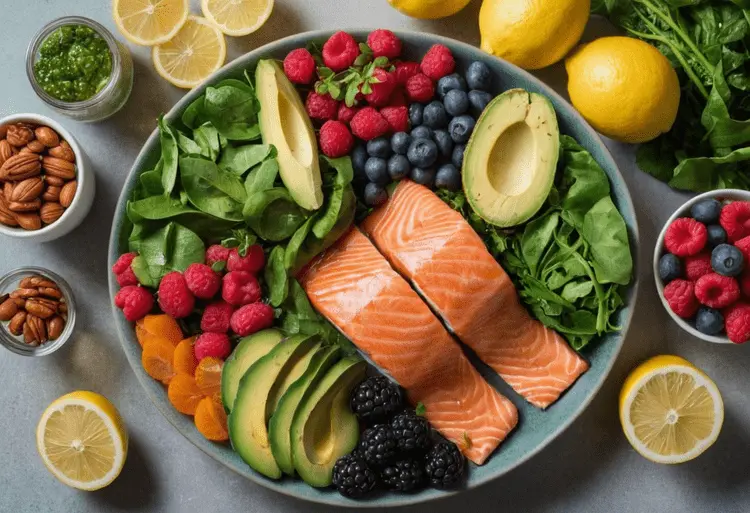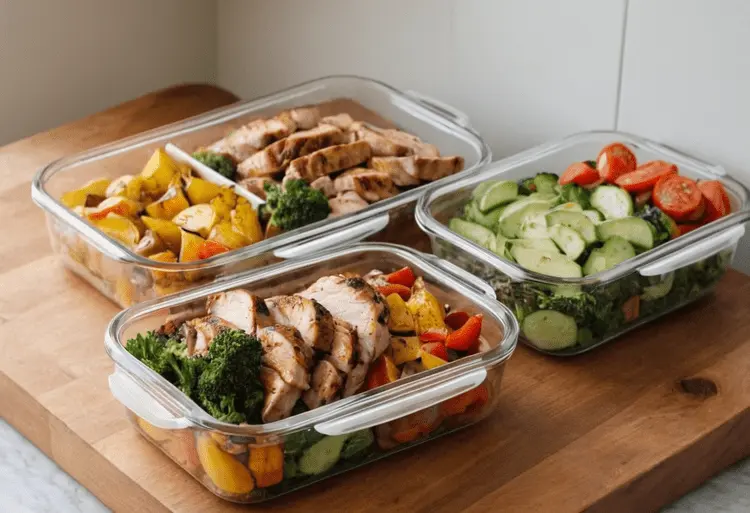A lipedema diet may be the missing piece in your fight against this frustrating condition. Do you struggle with the pain, swelling, and limitations of lipedema? Feeling frustrated and helpless about managing your symptoms?
Lipedema can significantly impact your quality of life. Typical weight loss solutions often fail, and the relentless inflammation can be overwhelming.
There’s hope! A targeted lipedema diet can help you take control. By focusing on anti-inflammatory foods, exploring options like the keto diet, and understanding the right nutrition for lipedema, you can reduce inflammation, manage your symptoms, and feel your best. Ready to unlock the power of your diet for lipedema management?
Lipedema Diet: The Quick Guide
- Eat whole, unprocessed foods
- Avoid refined sugars and carbs
- Prioritize vegetables and fruits
- Include healthy fats and protein
- Explore keto or intermittent fasting
- Stay hydrated
Table of contents
Lipedema: Understanding the Basics

So,have you ever noticed disproportionate fat buildup in your legs, arms, or hips? Does it feel tender to the touch, bruise easily, and refuse to budge even with exercise and healthy eating? If so, you might be experiencing lipedema.
What is Lipedema?
Lipedema is a chronic disorder where fat cells accumulate unevenly, typically in the lower body. This buildup leads to a distinct appearance and often causes discomfort and pain. It primarily affects women, and is often misdiagnosed as simple obesity.
Lipedema vs. Obesity & Lymphedema?
Is it stubborn weight, or something more? Here’s the difference:
- Obesity: Excess fat all over the body.
- Lymphedema: Swelling due to lymphatic system issues.
- Lipedema: Disproportionate fat with unique characteristics.
Also, getting the right diagnosis is crucial! Incorrectly labeling lipedema can make weight loss efforts frustrating and ineffective. So, talk to a doctor specializing in lymphatic issues or check out the National Lymphedema Network for more information.
Stages of Lipedema
Lipedema progresses in stages. Recognizing them helps tailor your management plan:
- Stage 1: Smooth skin, but fat buildup starts.
- Stage 2: Nodules appear, skin feels uneven.
- Stage 3: Larger fat masses, skin may harden.
Causes and Risk Factors
Why does lipedema happen? We’re still learning, but these factors play a role:
- Hormones: Often triggered by puberty, pregnancy, or menopause.
- Genetics: Family history may increase your risk.
So, Understanding lipedema sets the stage for the best management, including the upower of the lipedema diet. Let me know – have you been diagnosed, or could these symptoms sound familiar? Share your experiences below!
The Power of Diet for Lipedema Management
Think of food as your powerful ally if you have lipedema. What you eat directly influences inflammation, a key driver of lipedema symptoms. So, can a specific lipedema diet change things? Absolutely!
Lipedema Diet Anti-Inflammatory Eating Principles
Focus on whole, unprocessed foods – think nature made them this way! A lipedema-friendly diet emphasizes:
- A rainbow of vegetables and fruits: Load up on colorful produce for essential nutrients and antioxidants that fight inflammation.
- Healthy fats: Embrace avocados, olive oil, nuts, and seeds for satiety and reducing inflammation.
- Lean protein: Opt for quality sources like fish, chicken, beans, and lentils.
- Herbs and spices: These add flavor and powerful anti-inflammatory compounds.
Additionally, limiting certain foods helps tame inflammation. Minimize processed foods, refined sugars, and unhealthy fats.
Ketogenic Diet for Lipedema
Is a keto diet a good option for lipedema? Emerging research suggests it could be highly beneficial. A very low-carb, high-fat ketogenic diet shifts your body into fat-burning mode and may help reduce lipedema-related fat deposits.
The Role of Intermittent Fasting For Lipedema Diet
Intermittent fasting could be another powerful tool in your lipedema toolkit. This eating pattern involves periods of eating and fasting.
So it might reduce inflammation and promote cellular repair. Learn more about safe fasting strategies from experts at the Lipedema Foundation
Did you know the approach to eating for lipedema has similarities with managing menopause symptoms? The Galveston Diet is specifically designed for women in menopause – discover how it can help you feel amazing! Click here for recipes and tips.
Creating Your Lipedema-Friendly Diet Plan
Ready to transform your health and manage your lipedema symptoms? Let’s build a delicious and nourishing lipedema diet plan together!
Essential Foods to Include in Lipedema Diet

So think of your plate as a canvas for vibrant colors and health-boosting nutrients. Here’s what you want to fill your diet with:
- Non-starchy Vegetables: Pile on the leafy greens, broccoli, cauliflower, and all your favorites. They’re packed with fiber and antioxidants to fight inflammation.
- Low-Glycemic Fruits: Berries, apples, and citrus fruits provide sweetness, essential vitamins, and beneficial fiber.
- Healthy Fats: Think avocado, olive oil, nuts, and seeds. These powerhouses offer energy, satiety, and heart-healthy benefits.
- Lean Proteins: Opt for fish, chicken, eggs, and lean meats. They’ll fuel your body and help with muscle maintenance.
- Herbs and Spices: Flavorful and anti-inflammatory! Think turmeric, ginger, garlic, and other favorites.
Foods to Limit or Avoid
These foods can sabotage your progress and worsen lipedema symptoms. Steer clear of them as much as possible:
- Processed Foods: They’re high in unhealthy fats, sodium, and hidden sugars – a recipe for inflammation flares.
- Refined Sugars: Sweets, sodas, and sugary treats spike your blood sugar and contribute to inflammation.
- Potential Allergens: Common culprits include gluten and dairy. Is there a chance these are hindering your progress? Check out resources from the National Lymphedema Network to understand lymphatic health and manage these sensitivities.
Hydration is Key
Also water is your BFF! Aim for at least 6-8 glasses daily to promote detoxification and lymph flow. Herbal teas and naturally flavored water are great options too.
Meal Planning Tips
Is the idea of a lipedema diet overwhelming? Don’t worry! Here are some tips:
- Plan Ahead: Dedicate some time each week to planning your meals. This reduces impulsive and unhealthy choices.
- Prep Ingredients: Wash and chop veggies, cook lean proteins in bulk – it’ll make meal assembly a breeze.
- Keep it Simple: Don’t overcomplicate things! Simple, nourishing meals are the foundation of a sustainable diet.
Let me know – what are your favorite lipedema-friendly snacks and meals? Share below or tag me on social media!
Beyond Diet: Additional Lifestyle Factors for Lipedema
Your lipedema diet sets an excellent foundation, but it’s only one piece of the puzzle. Want to maximize your results and feel your best? Let’s dive into other powerful lifestyle changes that can make a world of difference!
Targeted Exercise
Moreover, regular movement is vital for everyone, but if you have lipedema, it’s about choosing the right activities. Focus on exercises that boost your lymphatic system and minimize impact on your joints. Think:
- Swimming: Gentle on your body, yet fantastic for circulation.
- Walking: Start slow and gradually build up your distance.
- Rebounding: Low-impact bouncing can stimulate lymphatic drainage.
- Strength training: Helps build the muscle that burns calories even at rest.
Compression Therapy
Is compression therapy right for you? Compression garments provide support and can assist with reducing swelling and discomfort, potentially slowing the progression of lipedema.
Consult with a healthcare professional specializing in lymphedema treatment to discuss your options.
Stress Management
Stress wreaks havoc on your hormones, which can worsen lipedema symptoms. Find healthy ways to unwind. Yoga, meditation, or simply spending time in nature can be incredibly beneficial. Looking for more tips on managing stress?
Sleep Hygiene
Are you getting enough quality sleep? When you’re sleep-deprived, your body struggles to regulate hormones and manage inflammation. Aim for 7-8 hours of restful sleep each night for optimal health and lipedema management.
The Power of Community
So don’t underestimate the power of connecting with others who understand your journey. Seek out lipedema support groups, either locally or online.
Let’s Chat! What’s working for you beyond your lipedema diet? Which of these factors are you eager to try? Share your thoughts below, or tag me on social media!
Personalizing Your Lipedema Diet Journey

Individualized Approach
Forget those cookie-cutter diet plans! Your lipedema diet journey is all about finding what works best for you. Everyone’s body is different, which means your perfect lipedema diet will be unique.
Is there a specific food that triggers your lipedema symptoms? Do you feel energized on lower-carb days? Pay attention to these individual responses. They’re crucial clues!
Mindful Eating Practices
So, let’s turn inward for a moment. How do you approach eating? Do you rush through meals, or are you present and savoring each bite? Mindful eating can deepen your connection with food and your body, helping you make lipedema-smart choices with ease.
Try experimenting with mindful eating techniques – you can find helpful tips and resources on the WebMD website focused on inflammation. It could revolutionize how you think about food!
Staying Motivated and Celebrating Successes
Listen, sticking to any lifestyle change takes effort. There will be great days and some not-so-great days. That’s perfectly normal! The key is focusing on progress, not perfection.
How do you celebrate wins along your lipedema diet journey? Is it treating yourself to a new lipedema-friendly recipe or enjoying a relaxing bath? Recognize even the smallest victories – they pave the way for lasting change!
- Non-scale victories: Improved energy, reduced inflammation, better-fitting clothes
- Share your progress: Inspire others and get support from the amazing lipedema community on the National Lymphedema Network website.
Let me know if you’d like help crafting more sections of your lipedema diet article, would love to help further! Are you on social media? Let people know about your article and invite them to share their thoughts.
Intrigued by the power of diet for lipedema? The 90-30-50 Diet Plan introduces another exciting approach to nutrition for weight management and overall health. Could this be the next step to maximizing your results?
Your Lipedema Diet Questions Answered
Focus on limiting processed foods, refined carbohydrates (think white bread and sugary treats), unhealthy fats, and potential allergens like gluten or dairy.
Losing lipedema fat can be challenging, but a combination of strategies can help. This includes an anti-inflammatory lipedema diet, lymphatic-boosting exercise, compression therapy, and potentially specialized treatments (always consult your doctor).
Yes! Eggs are an excellent source of protein and healthy fats, making them a good choice for a lipedema diet.
Absolutely! Walking is a fantastic low-impact exercise that helps improve lymphatic flow and circulation, which can be beneficial for managing lipedema.
While a lipedema diet focuses primarily on reducing inflammation and managing symptoms, it can also support healthy weight management. However, it’s important to remember that lipedema fat may be less responsive to diet and exercise alone.
Unfortunately, the lipedema diet is not a cure. It’s a crucial tool for managing the condition, reducing inflammation, pain, and potentially slowing its progression.
Everyone responds differently. Some people might notice improvements in a few weeks, while others take longer. Focus on positive changes in your overall well-being, not just the number on the scale.